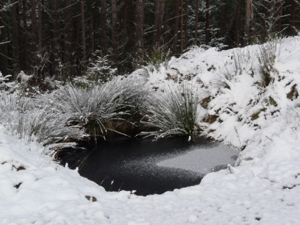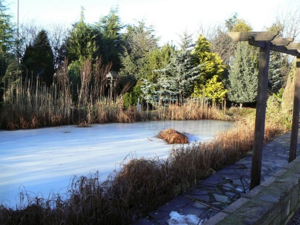
Icy Pond in Struie Wood by Sylvia Duckworth. Creative Commons. http://commons.wikimedia.org/wiki/File:Icy_pond_in_Struie_Wood_-_geograph.org.uk_-_1055578.jpg
Earlier this year I pondered adding a pond to the garden. As the temperature finally falls to winter levels, I'm wondering how much work I might be letting myself in for if I go ahead. Success with Your Garden Pond, a book published in 1994, would have me baling out water, catching fish, dredging sludge, refilling and covering with plastic for the winter months.
It all sounds rather exhausting.
Winter care for garden ponds with fish
But of course, it really depends on what you have in your pond. If you have fish, then you'll probably need to do more, use more equipment, and juggle decisions. Pumps, heaters and filters to keep water circulating and remove toxins are recommended, but a filter definitely should be removed before it freezes and a pump might have to be too.
You'll also have to keep an eye on the temperature and either feed fish a special wheatgerm diet (to aid digestion and reduce ammonia production) or stop feeding them completely. And, given that fish in ponds provide an easy target for predators, you might want to get a heron scarer.
Hmm. Not sure I'm ready for fish.
Winter care for garden ponds without fish
However, just because a pond doesn't contain fish, it doesn't mean you can ignore it till Spring. The important thing is to keep the water oxygenated. Oxygen diffuses into the pond from the air, but you should also grow oxygenating plants in the water. Foliage overshadowing the water needs to be trimmed back, so more light can enter and those underwater plants can breathe.
Cutting back foliage also reduces the amount of vegetation entering the water, where it would rot and release toxins. In fact, a pond net might be an idea to stop debris falling in, though I think I'd want to leave part of the water open so that wildlife could take a drink. You still need to inspect the net regularly to ensure that it's not completely covered (so blocking out light) or, without a net, inspect the water and remove floating leaves.

Frozen Ornamental Pond by James Allen. Creative Commons licence. http://commons.wikimedia.org/wiki/File:Icy_pond_in_Struie_Wood_-_geograph.org.uk_-_1055578.jpg
According to national charity Freshwater Habitats Trust, (formerly Pond Conservation), frogs often hibernate at the bottom of ponds. They tolerate low oxygen levels, but will die after a few days if the water is totally de-oxygenated. So, if snow falls on a frozen pond, it should be cleared from the surface; it blocks out all light beneath, preventing plants from doing their job.
Froggy hibernation also raises concerns about ponds freezing solid, as the amphibians certainly wouldn't survive.
The Trust launched its Big Pond Thaw Survey after the winter of 2009/10 caused ponds to freeze over and brought in numerous reports of dead fish and amphibians.
Much is usually made of having a pond deep enough not to freeze completely. However, the Trust reported:
"We know that most ponds didn't have more than a few centimetres of ice, even during the very coldest days of the 2009-10 winter - so freezing solid isn't the problem."
Results were not conclusive but indicated that, as fewer amphibians were found dead where a pump was running or plants were present, deaths might have resulted from reduced oxygen levels in the water. They add that a build-up of toxic gases might also be implicated.
Surprisingly, they add:
"We don't think that making a hole in the ice will affect the amount of oxygen diffusing into the water, since this is a naturally slow process."
It seems accepted that you shouldn't bang on ice to break it up, as this could have unwanted percussive effects on wildlife beneath. However, keeping an area of water open seems a good precaution. The research didn't gather evidence on the presence of toxic gasses (which need to escape), and it seems kinder to keep drinking water available for larger animals and birds. The Trust also adds:
"It may still be worth making a hole in the ice to allow more active animals like fish or newts to move to the surface to breathe air."
One solution is to float a ball on the surface, though in very cold weather this probably wouldn't stop ice forming. If you want to be absolutely sure your water doesn't freeze over completely, you need a pond heater. It doesn't have to be very powerful. Only if you've got a heavily stocked Koi pond do you need an 'in pond' heater. For my future pond, I can see that a surface heater would be enough to keep a small area of water open.
As the Freshwater Habitats Trust itself says:
"There's no harm in playing safe."
In association with Swell UK.
The bedding scheme above is looking a bit patchy at the moment, but the idea is to create an impression of a landscape seen from above. Blocks of plants like Euonymus fortunei 'Emerald Gaiety", Primula 'Alaska Limelight' and Erica x darleyensis 'White Spring Surprise' will knit together into a patchwork. At the moment the silver birch stakes are saving it from too much prostratation.


 ...Landscape Juice Network
...Landscape Juice Network
Recent Comments